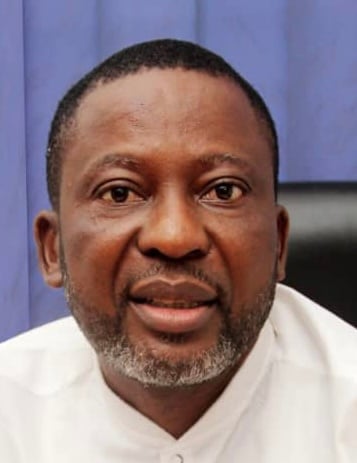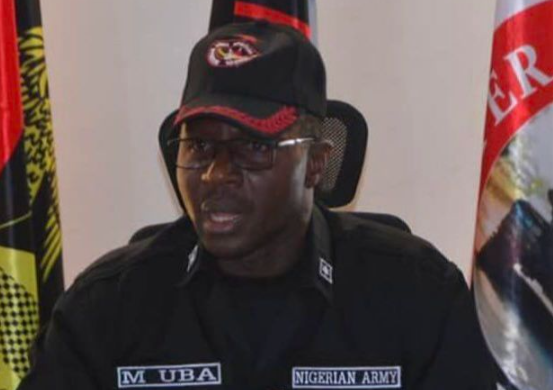Uba
Brigadier General Musa Uba’s death confirmed by the Nigerian Army after days of confusion and frantic denials, landed like a detonator in a country already flattened by repeated blasts of terror. The image that circulated online of a brigade commander in the hands of Islamic State West Africa Province (ISWAP) fighters was not only a human tragedy; it ruptured the story Nigeria tells itself about control, competence and the boundary between soldier and state.
His death has become more than a battlefield loss; it has become a riddle that refuses to fade. Beneath the official condolences and guarded press statements lies a heavier question everyone is asking in hushed tones: was General Uba lost to enemy fire, or to the cruelty of betrayal?
After surviving many battles against insurgents in the North East, Uba, Commander of the 25 Task Force Brigade, paid the supreme price following an ambush. He was leading his men and members of the Civilian Joint Task Force (CJTF) when insurgents struck along the Damboa–Biu axis, killing four operatives: two soldiers and two CJTF members.
Uba escaped the initial ambush and was communicating with military authorities as he attempted to return to base when he was captured by the terrorists and subsequently killed.
Advertisement
A member of the 48 Regular Course, General Uba studied Political Science at the Nigerian Defence Academy. He gained admission in 1996 and graduated in 2001. He was subsequently commissioned as a second lieutenant into the infantry corps of the Nigerian Army. His first posting was to a Battalion in Jaji, Kaduna State.
What makes his killing especially corrosive is what it reveals or forces us to reckon with about the porousness of Nigeria’s security architecture. A senior officer of the rank of a Brigadier General with years of frontline experience, was neutralized without sustained resistance, without backup and without extraction.
The circumstances of his capture and execution raise urgent questions that demand answers. How did he find himself isolated and surrounded by enemy fighters, cut off from his unit and fighting alone? How does a brigade commander end up abandoned on the front line without the cover of his troops? Was it miscommunication, panic, operational failure or something darker: deliberate compromise?
Advertisement
Why did a top ranking officer remain missing for so long without a swift, coordinated response? Why did intelligence units not immediately track the insurgents’ movements that followed his capture? Why did communications fail at the decisive moment? Why did elements of the mission appear to leak, almost in real time, to enemy networks?
Nigeria’s security system has long battled external adversaries. Increasingly, however, the nation faces a more unnerving threat: internal compromise. Over the years, patterns have emerged: ambushes striking with uncanny precision, convoys hit with deadly accuracy, troops’ movements intercepted with alarming precision, and so forth.
Soldiers and officers quietly admit what the public fears: infiltrators, collaborators and informants operate in the shadows of the military establishment. Could General Uba have been a victim of this sell out? Did someone within the ranks reveal his movement? Was the abandonment a result of fear or the cold precision of sabotage? These are not accusations; they are questions that demand specific answers from both military and political authorities.
Beneath the immediate sorrow lies a broader, troubling issue of the enemies within. Over the past decade, Nigerians have seen a worrying pattern of terror groups striking with renewed ferocity and a surprising inertia or inaction on the part of the military to confront headlong this murderous terrorists.
Advertisement
Too often, the leadership’s responses are short term fixes: negotiated surrenders, programs for “repentant” militants, amnesty for disarmament gestures and the recruitment of former terrorist fighters into security agencies. These programs are usually designed with weak oversight.
In practice, many who return home labeled “repentant” never complete proper rehabilitation; some relapse into violence, others drift into criminality and the danger intensifies when such individuals are reintegrated into the military or police structures they formerly opposed while still retaining loyalties to their former commanders.
Instances abound of surrendered militants slipping from rehabilitation pathways and mingling with insurgent networks, a reality that gnaws at the credibility of reintegration schemes.
The international record is cautionary. After the 2003 invasion of Iraq, policies that purged experienced state functionaries and the mishandling of former soldiers and bureaucrats helped create fertile recruitment grounds for violent groups, contributing to the rise of ISIS. Colombia’s long experiment with demobilizing FARC fighters shows how fragile reintegration can be: success for some, relapse for others. Where ex-combatants are reabsorbed without durable livelihoods, community reconciliation and accountable oversight, the risk of recidivism remains real. These are not abstract lessons; they are practical warnings whose edges are visible now in North Eastern Nigeria.
Advertisement
In General Uba’s case, safeguards appear to have failed in measurable ways: operational risks on the ground; gaps in tactical communications; the corrosive effect of sensational social media on active operations; and strategic vulnerabilities in policy that treat reintegration as a checkbox rather than a complex social project.
Field reports paint the portrait of a commander who led from the front, eager and ready to confront the terrorists headlong. But there was also online media frenzy detailing the movements of the troops. Terror groups monitor the same channels; they harvest signal from noise. On platforms where a single post can pinpoint a moving unit’s coordinates, the line between situational awareness and operational exposure becomes perilously thin.
Advertisement
These global examples force a sober conclusion: reintegrating fighters is not the same as neutralizing a threat. Done well, reintegration can transform violent actors into productive citizens and weaken the enemy’s recruitment pitch. Done poorly, it legitimizes networks, allows weapons and ideology to circulate under the radar, and becomes a political liability the country pays for in lives and territory.
Given the circumstances surrounding General Uba’s capture, Nigeria needs operational transparency that does not expose troops, communications that inform the public without compromising operations.
Advertisement
There must be a rigorous vetting and long-term monitoring architecture for surrendering militants; combining psychosocial rehabilitation, economic inclusion, community led reconciliation and intelligence-led oversight.
There must also be an institutional reckoning: corruption, patronage and political interference that allow insurgent networks to survive within official structures must be rooted out.
Advertisement
And there should be an honest national dialogue about security strategy that includes families of military personnel, local communities, civil society organisations and international partners who can lend technical capacity without replacing local accountability.
Brigadier General Musa Uba’s death should be mourned as a personal sacrifice and treated as a national alarm bell. To let it pass as another statistic would be a betrayal not only of the officer who fell, but of every soldier still in the field and every family waiting at home.
If the door his death has opened is to lead anywhere other than deeper despair, it must swing toward real reform: how Nigeria fights, how it heals, and how it prevents those who gave their lives from having died in vain.
The military is built on trust between soldier and soldier, and between the institution and the nation. When that trust breaks, the battlefield becomes more dangerous than the enemy itself.
Whether General Uba fell to bullets or betrayal, the nation owes him more than sorrow: it owes him answers. What lies behind the door his death opened will determine whether Nigeria regains its security or lose more men to shadows wearing familiar faces.
Kalu Okoronkwo is a communications strategist, a leadership and good governance advocate dedicated to impactful societal development and can be reached via [email protected]
Views expressed by contributors are strictly personal and not of TheCable.



